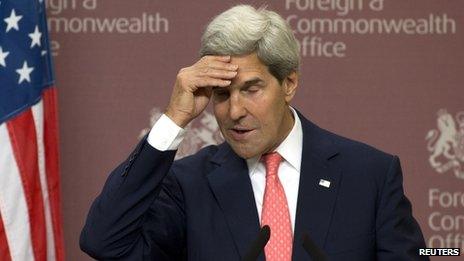Mardell: Slender chance Russia proposal saves Obama
- Published

Kerry was "thinking aloud" when he said he foresaw circumstances in which there could be US boots on the ground in Syria
The Russian idea to get rid of Syrian chemical weapons probably weakens US President Barack Obama's already weak hand and leaves the White House in something of a quandary.
However, there is a slender chance it saves his bacon.
I must admit, when I saw the Russian rapid response to US Secretary of State John Kerry's musings about such a deal, it crossed my mind this had been cooked up in advance.
If the Syrians quickly backed down, that could let President Obama off the hook for a vote that is going to be very tricky for him.
But if this is choreography, then there are some startlingly good actors in the White House and at the US Department of State, who appear less than impressed.
At State, they sounded very cynical about the Russian plan: "Picking up this ball and turning it into something it was never intended to be is an example, quite frankly, we think, of yet another stalling tactic."
The White House say they will "look hard" at the idea but note Mr Assad's track record doesn't suggest he can be trusted. They argue that only their threat of force has brought this response, so it makes the case for a "yes" vote.
They have a point, but I suspect many more in Congress - who don't want action anyway - will feel this glimmer of hope is another reason to vote "no".
If the White House has based its whole case on common sense, then there is nothing more common sense than putting chemical weapons beyond use. It will make other countries even more keen on the UN route.
It is a distraction from the big sell, another question to divert President Obama from making a straight case. If action is delayed, it will annoy those senators who want a grander action aimed at regime change, even if that is now called "degrading assets".
It raises even more memories of Iraq - the ability of regimes to play games with weapons inspectors and for the US to use that as a reason for action.
Mr Kerry was "thinking aloud" the other day when he envisaged some circumstances where there could be boots on the ground. This is being called "a rhetorical statement" by his staff.
I dislike politicians being forced to speak in confined straight lines, but you can see why their communications directors may not feel the same.
Many in the world may regard this as a hopeful day. I suspect that is not the mood in the White House.